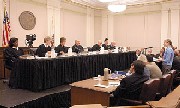7/3/2006
California Supreme Court Extends Car Searches to PassengersFull text of California Supreme Court rulings that grant police the power to search passengers in vehicles at traffic stops.

In a pair of rulings issued Thursday, the California Supreme Court extended the authority of police to search both the driver and passengers of vehicles in traffic stops, even when the basis of the search is nothing more than a missing front license plate.
"We find that the passenger, whose progress is momentarily stopped as a practical matter, is not seized as a constitutional matter in the absence of additional circumstances that would indicate to a reasonable person that he or she was the subject of the peace officer's investigation or show of authority," the court concluded in a 4-3 decision in the first case, People v. Brendlin.
This case began in November 2001 after a Sutter County sheriff acting on a hunch stopped a 1983 Buick Regal that had expired registration tags but a legitimate temporary permit displayed in the window. During the stop, the officer asked for the license of the driver and asked the passenger, Bruce Brendlin, to identify himself. The officer recognized Brendlin as a man wanted for parole violations. The officer then arrested the driver and Brendlin and found drugs in a search of the vehicle.
The court found that even though the traffic stop was illegal, the passenger was not "seized" by the traffic stop and could have ignored the police left the vehicle at any time. As a result of the court's analysis, passengers in California will not enjoy the same Fourth Amendment protection against unreasonable search and seizure as the driver.
In a strongly worded dissent, three justices rejected the majority's reasoning.
"Passengers in a vehicle pulled over for a traffic stop are not free to leave, in either a practical or a constitutional sense," Justice Carol A. Corrigan wrote. "Certainly no one can safely leave the vehicle before it stops. Once it has pulled over, the officer has the authority, as a matter of law, to order that the passengers remain inside or get out of the vehicle. This authority is soundly based on the need to protect the officer's safety."
Eight of the twelve federal circuit courts of appeal and twenty-one state courts have ruled that passengers are seized when a vehicle is pulled over.
In the second case, People v. Saunders, California's high court ruled that not displaying a front license plate was sufficient justification to pull over a vehicle and question the passenger. The full text of both rulings is available in a 112k PDF file at the source link below.
Update: The US Supreme Court overturned this ruling on June 18, 2007. (Read the US Supreme Court ruling)


